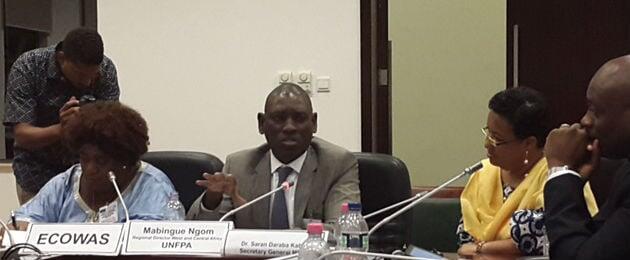Malabo, 19 July 2015. Ministers and high level officials from Guinea, Liberia and Sierra Leone; the African Union Commission (AUC); the Economic Community of West African States (ECOWAS); the Mano River Union (MRU); UNFPA, the United Nation Population Fund; the United Nations Agencies and development partners have met to bring a collective response to the challenges related to the impact of the Ebola Virus Disease (EVD) on maternal, newborn and adolescent health as well as youth development in light of harnessing the demographic dividend for sustainable development.
Based on the ongoing experience of the Mano River Maternal Health Response (MRMR) which is generously funded by the Government of Japan, and through a panel discussion, participants discussed the national response with regards to health systems and human resources for health such as midwifery, health systems strengthening and resilience regarding maternal, newborn and adolescent health.
“The Mano River Maternal Health Response is an initiative that has given hope to the three countries most affected by Ebola. The initiative has brought hope to many women who could not access maternal health services during the peak of the EVD epidemic. Its continuation is strongly encouraged for the well-being of women and youth in the region”, said the Minister of Health of Guinea, HE Dr. Colonel Remy Lamah. He praised UNFPA for ensuring that women continued to access health services even at the peak of the EVD outbreak.
The African Union Commission represented by the Commissioner for Social Affairs, HE Dr Mustapha Sidiki Kaloko, highlighted the fact that the MRMR builds on cross border realities: “The MRMR is very useful and relevant today and is an opportunity to address the impact of EVD on Maternal Health and contribute to the achievement of Sustainable Development Goals (SDGs) and the Africa’s Agenda 2063”.
In his closing remarks, the Regional Director of UNFPA for West and Central Africa, Mr. Mabingue Ngom, stressed the importance of “country-led multiple partnerships, with the right mix of stakeholders, leading to success in both the short, and the long term”.
The high Level Ministerial Dialogue was conducted in the margins of the International Conference on Africa’s Fight against Ebola “Africa helping Africans in the Ebola Recovery and Reconstruction” held from 20 to 21 July 2015 in Malabo, Equatorial Guinea. The Ministerial Dialogue concluded by adopting a Call to Action aiming at positioning the MRMR as a key country-driven initiative to effectively address strengthening of national health systems, especially to strengthen human resources for health including midwifery. The Call to Action recognized the need to mobilize additional resources for investments in the training of health workers for maternal health; and to address the needs of communities in accessing sexual and reproductive health and family planning services. Furthermore, the Call to Action described the MRMR initiative as an innovative partnership, a manifestation of the countries’ desire to build resilient health systems, with at its centre human resources as a catalyst to achieving SDGs.
Initiated by UNFPA, the MRMR aims at building resilience and supporting recovery through integrated and strengthened maternal health in Guinea, Liberia and Sierra Leone, the three countries most affected by Ebola.
UNFPA works to deliver a world where every pregnancy is wanted every childbirth is safe and every young person’s potential is fulfilled.


